Module 1
1. Module 1
1.4. Page 2
Module 1—Momentum and Impulse
 Explore
Explore

© Lisa Kyle Young/iStockphoto
What's the most important piece of equipment for reducing the severity of injuries caused by a motorcycle collision? Most experts agree that it's a well-designed helmet. Approved helmets are designed to withstand the very large forces that can occur at the point of impact. As you learned in previous courses, an unbalanced force always acts when a mass undergoes a change in velocity. A change in velocity could mean a change in the magnitude of the velocity, resulting in the object speeding up or slowing down. A change in velocity could also mean a change in direction. You can learn more about factors that affect the directions of two objects after a collision in the next activity.
 Read
Read
To find out more about collisions, read page 446 of your textbook.
 Try This
Try This
Follow the instructions and complete “9–1 QuickLab: Predicting Angles After Collisions” on page 447 of your textbook. As you make observations and collect data, use the questions at the end of the activity to help guide your work.
TR 1. Answer question 1 at the end of the QuickLab.
TR 2. Answer question 3 at the end of the QuickLab.
Momentum

© Kinetic Imagery/shutterstock
You can use the word momentum in everyday language to describe various events—sporting events, political campaigns, or economic trends. However, regardless of what is being described, the word momentum always implies sustained movement. For example, the expression “Team X has gained momentum” means that the team is “on the move” and will be difficult to stop— the greater the momentum, the harder it is to stop the team.
In physics, the word momentum has a similar meaning but it is related to the quantity of motion possessed by an object.
momentum: the product of the mass and velocity of an object
Expressed as an equation, it is ![]() .
.
 Read
Read
You can find out about the exact meaning of the word momentum in physics by reading pages 448 and 449 of your textbook.
 Self-Check
Self-Check
SC 1. Produce a short summary that includes the key ideas about momentum.
 Self-Check Answer
Self-Check Answer
SC 1.
Momentum is the product of the mass and velocity of an object.
Expressed as an equation it is ![]()
Quantity |
Symbol |
SI Unit |
momentum |
|
kg·m/s |
mass |
m |
kg |
velocity |
|
m/s |
Since momentum is the product of a vector (velocity) and a scalar (mass), it is a vector quantity. The direction of the momentum vector is in the same direction, as the velocity of the object.
Problem Solving with Momentum
When solving problems, it is useful to follow the GRASP model for problem solving. The GRASP model is on page 867 in your textbook.
Since momentum is a vector, it is very important to clearly communicate direction. Note how a sign convention is used to handle direction in each of the following examples.
Example Problem 1
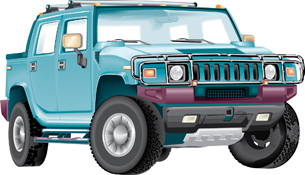
Determine the momentum of a vehicle with a mass of 2100 kg moving at a velocity of 22 m/s, east.
Given

Required
The momentum of the vehicle, ![]() .
.
Analysis and Solution
Let east be the positive direction.

Paraphrase
The momentum of the vehicle is 4.6 × 104 kg·m/s [E].
Example Problem 2
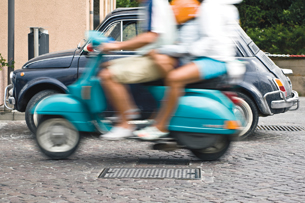
© Claudio Arnese/iStockphoto
In many countries motorized scooters are a very popular form of transportation. The total momentum of two people on a scooter is 7.20 × 103 kg·m/s [S]. If the combined mass is 250 kg, determine the velocity of the people on the scooter.
Given

Required
The velocity of the vehicle, ![]() .
.
Analysis and Solution
Let south be the negative direction.
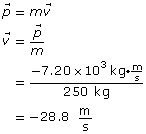
Paraphrase
The velocity of the motorcycle and riders is 28.8 m/s [S].
Example Problem 3
An airplane has a momentum of 8.3 × 107 kg·m/s [N]. If the airplane is flying at a velocity of 990 km/h [N], determine its mass.
Given
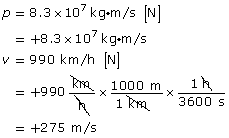
Required
The mass of the airplane, m.
Analysis and Solution
Let north be the positive direction. This solution involves dividing momentum by velocity. Recall that multiplying or dividing one vector by another is beyond the scope of high school physics. Therefore, the vector notation is dropped.
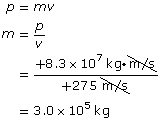
Paraphrase
The mass of the airplane is 3.0 × 105 kg.
Scalars and Vectors
As you saw in the example problems, the vector nature of momentum plays a significant role in problem solving. If you’d like a review of vectors and the use of vector notation, take a few minutes to complete this vector review. If you feel confident in your understanding of vectors and the use of vector notation, continue on with the lesson.
 Self-Check
Self-Check
SC 2. What is a scalar quantity? Give two examples.
SC 3. What is a vector quantity? Give two examples.
SC 4. The following diagram shows a ship being towed out of a harbour by two tugboats.
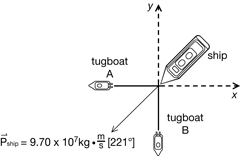
The momentum of the ship is 9.70 x 107 kg·m/s [221°]. What is the component of the momentum provided by tugboat A? What is the component of the momentum provided by tugboat B?
SC 5. Calculate the momentum of a 70.0-kg person travelling west at 5.0 m/s.
SC 6. A motorcycle has a velocity of 95 km/h [N] and a momentum of 7250 kg·m/s [N]. Determine the mass of the motorcycle.
 Self-Check Answer
Self-Check Answer
SC 2. A scalar quantity is a measurement that has magnitude only. Examples include time and mass.
SC 3. A vector quantity has both magnitude and direction. Examples of vectors include velocity, force and acceleration.
SC 4.
Given
![]()
Required
The component of the momentum provided by tugboat A, ![]() ship x.
ship x.
The component of the momentum provided by tugboat B, ![]() ship y.
ship y.
Analysis and solution
The momentum of the ship is provided by two tugboats. Tugboat A provides the component in the negative x direction. Tugboat B provides the component in the negative y direction. The component can be determined by using trigonometry.
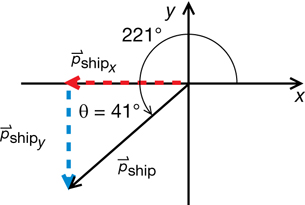
Momentum |
X component |
Y component |
|
|
|
Paraphrase
The component of the momentum provided by tugboat A is ![]() , in the negative x direction.
, in the negative x direction.
The component of the momentum provided by tugboat B is ![]() , in the negative y direction.
, in the negative y direction.
SC 5.
Given

Required
The momentum of the person, ![]() .
.
Analysis and Solution
Let west be the negative direction.

Paraphrase
The momentum of the person is
SC 6.
Given
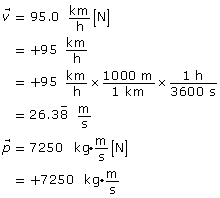
Required
The mass of the motorcycle, m.
Analysis and Solution
Let north be the positive direction.
This solution involves dividing momentum by velocity. Dividing one vector by another is beyond the scope of high school physics so the vector notation is dropped.
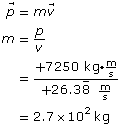
Paraphrase
The mass of the motorcycle is 2.7×102 kg.
 Module 1: Lesson 1 Assignment
Module 1: Lesson 1 Assignment
Remember to submit the answers to A 1, A 2, A 3, and A 4 to your teacher as part of your Module 1: Lesson 1 Assignment.
 Assignment
Assignment
A 1. Use reasoning to determine if one of the following objects in each of these pairs has a greater value for the magnitude of its momentum than the other. (No calculations should be required.)
-
a 900.0-kg truck travelling at 60 km/h, or a 500.0-kg car travelling at 60 km/h
-
a 15.0-kg object travelling to the right at 5.0 m/s, or a 15.0-kg object travelling to the left at 5.0 m/s
-
a 900-kg truck at rest, or a 500-kg car at rest
-
a 900-kg truck at rest, or a mosquito flying at 2 m/s
A 2. Solve question 9 on page 453 of your textbook.
A 3. Solve question 12 on page 453 of your textbook.
A 4. Solve question 15 on page 453 or your textbook.

